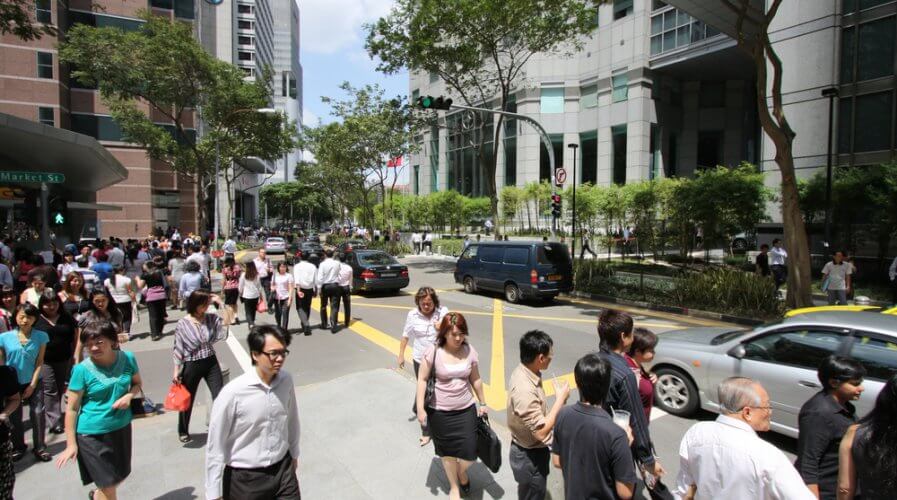
Singapore has a great fintech ecosystem says Reed Smith counsel. Source: Shutterstock
Reed Smith counsel talks about the fintech ecosystem in Singapore
SINGAPORE is home to a lot of fintech companies in the region.
The country is home to more than 40 innovation labs focused on fintech startups, and fintech firms in the country attracted more than SGD500 million (US$362 million) in investments last year.
Further, fintech companies in the country not only just have the support of the Monetary Authority of Singapore (MAS) but also the Ministry of Communications and Information and the Infocomm Media Development Authority (IMDA), among other local regulatory bodies and agencies.
While neighboring countries seem to be attentive to the needs of the fintech companies, Singapore seems to be doing something right (and better).
To get a better understanding of why Singapore is home to the biggest fintech startups in Southeast and the APAC, Tech Wire Asia caught up with Reed Smith Financial Regulatory and Fintech Counsel Hagen Rooke.
Having moved to Singapore in 2015, Rooke has witnessed the changes in the country’s regulatory environment and closely observed all of the strategies that the government has used to mold itself into a leading fintech haven in the region.
“Singapore is favorable to both inward investment and home-grown start-ups because it already has a critical mass of fintech players, readily available skilled labor, a reliable legal system, and industry associations that provide a forum for stakeholders to share knowledge and pursue collective interests (such as the Singapore Fintech Association).”
Further, Rooke highlights that English is the lingua franca in the Singapore financial and tech sectors, and geographically, Singapore is proximate to numerous Asian jurisdictions and functions as a springboard for fintech firms wishing to expand into the region.
What the counselor really likes about Singapore, however, is the fact that Singapore’s financial regulator – the MAS – recognizes that strength in fintech is a differentiating factor that allows the country to play a key regional role as an innovation hub and supports its more general objective of becoming a “smart nation”.
The government has gone to great lengths to make the Singapore FinTech Festival one of the key items in the global fintech community’s annual agenda, and this event has become a major forum for private-sector players, global regulators and thought leaders alike to exchange knowhow and announce new initiatives.
The MAS has also introduced a number of regulatory frameworks which cater specifically to fintech firms.
These include the Payment Services Act (an updated framework for the supervision of payment firms, including cryptocurrency exchanges), two different types of sandbox (allowing fintech firms to trial novel business models without going through a full licensing process) and a digital banking framework, among others.
“The focus on regulating nascent fintech models does mean that some firms which formerly enjoyed a more light-touch regulatory environment will assume a greater compliance burden than previously (e.g. cryptocurrency exchanges).”
However, the MAS takes a proportionate and risk-based approach to imposing regulation, with a view to ensuring that it counters risks to markets and consumers whilst allowing viable players to continue to operate and innovate.
On balance, Rooke believes that doing so only aids Singapore’s reputability as a fintech center.
Is there a flipside to running a fintech firm in Singapore?
From the looks of it, Singapore seems the place to be for fintech startups. Is it really so?
Speaking from experience dealing with (aspiring and existing) fintech clients in the country, Rooke explains Singapore functions as a natural starting-point for businesses wishing to operate across the APAC.
“From a regulatory perspective, a number of fintech firms take the view that Singapore requires them to maintain a high baseline standard of compliance, meaning that once they are up and running in Singapore, they can use their existing processes to operate compliantly across the region.
“While this is true to some degree, there is currently no noteworthy harmonization of regulation across APAC jurisdictions, and differences in requirements do exist from one country to the next.”
Singapore-based fintech firms, therefore, still need to make specific inquiries into local requirements before expanding cross-border, and need to implement compliance arrangements for these on a case-by-case basis.
Language and culture are also frequently cited advantages of using Singapore as a springboard for APAC business, explains Rooke.
“Fintech firms that use Singapore as their APAC headquarters find it easier here than elsewhere to find staff who are familiar with a multitude of regional languages and cultural approaches.”
Should fintech firms migrate to Singapore post-Brexit?
For UK fintech companies, the pros and cons of maintaining their operations in the UK post-Brexit will need to be weighed up once the terms of the UK’s departure from the European Union become clear, Rooke told Tech Wire Asia.
“Currently, there is still considerable uncertainty in this regard. However, irrespective of Brexit, any fintech firm operating outside APAC that wishes to establish operations in this region should consider setting up a base in Singapore.”
Of course, any firm wishing to operate as a regulated entity must usually have a certain amount of financial and operational substance at the outset.
In this respect, key requirements include capital and minimum staffing requirements, often combined with a need to demonstrate a track record in the relevant sector.
These requirements can act as a hurdle to entry for early-stage startups, which therefore often need investor backing to meet regulatory threshold conditions.
“The MAS recognizes this and provides various types of support to the startup community, for example in the form of legal advice clinics and sandbox schemes. Singapore also has a well-developed venture capital and accelerator scene which supports fledgling fintech businesses,” highlighted Rooke.
Overall, Singapore has invested heavily in fintech, and will no doubt continue to go to great lengths to maintain its international competitiveness in this sector. To the fintech entrepreneurs Rooke counsels, Singapore is a great place to be — in most cases.
READ MORE
- Ethical AI: The renewed importance of safeguarding data and customer privacy in Generative AI applications
- How Japan balances AI-driven opportunities with cybersecurity needs
- Deploying SASE: Benchmarking your approach
- Insurance everywhere all at once: the digital transformation of the APAC insurance industry
- Google parent Alphabet eyes HubSpot: A potential acquisition shaping the future of CRM




